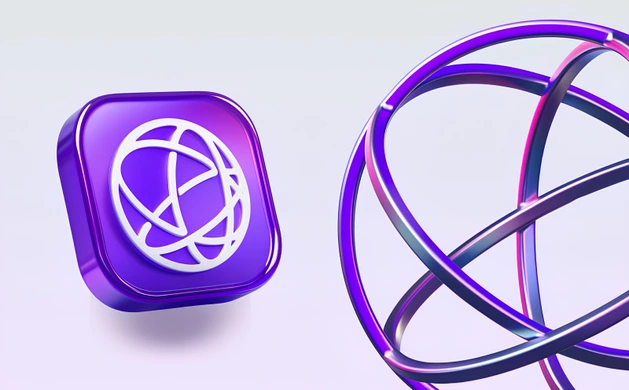Best Crypto Exchanges in Italy
.webp)
Summary: Crypto exchanges in Italy operate within a clear regulatory framework governed by the Organismo Agenti e Mediatori (OAM), Commissione Nazionale per le Società e la Borsa (CONSOB), and the Bank of Italy, closely aligning with the EU's Markets in Crypto-Assets Regulation (MiCA).
Below are six of the most reliable cryptocurrency trading platforms for Italian investors:
Kraken leads for Italian investors with its OAM license, broad crypto options, transparent reserves, and advanced tools like staking and futures trading.
Licenses
Compliant with MiCA regulations
Available Assets
450+ Cryptocurrencies
EUR Deposit Methods
SEPA, IBAN, Bank Transfer, Cards
Top Crypto Trading Platforms in Italy
Italian investors have a wide choice of crypto exchanges to choose from, each operating in accordance with regulatory frameworks established by CONSOB, the Bank of Italy, and the Organismo Agenti e Mediatori (OAM). This overview presents Italy’s leading trading platforms, comparing their Euro deposit options, trading costs, platform security, and available digital currencies.
1. Kraken
Kraken is the best cryptocurrency exchange in Italy, offering diverse trading options, advanced security, several Euro deposit options, and unique investment features. Launched in 2011, it now serves over 15 million users worldwide and offers a multilingual interface accessible in Italian.
Users benefit from various trading opportunities, including spot trades, leveraged margin trading (up to 5x leverage), and a wide range of crypto futures contracts. The exchange offers more than 450 cryptocurrencies, allowing diverse investment strategies across stablecoins, altcoins and memcoins.
Kraken Pro appeals especially to experienced traders who prefer detailed market analytics and sophisticated order types. Security includes industry-leading practices, such as air-gapped cold storage, multi-factor authentication, and routine proof-of-reserves audits to ensure asset transparency.
Platform Highlights:
- Fees: Maker fees from 0.16%, taker fees from 0.26%; discounts available with Kraken Pro.
- Supported Assets: 450+ cryptocurrencies.
- Regulation & Licensing: Authorized to operate in Italy under EU MiCA regulations.
- EUR Deposit Methods: SEPA, IBAN, bank transfers, PayPal, credit cards, and debit cards.
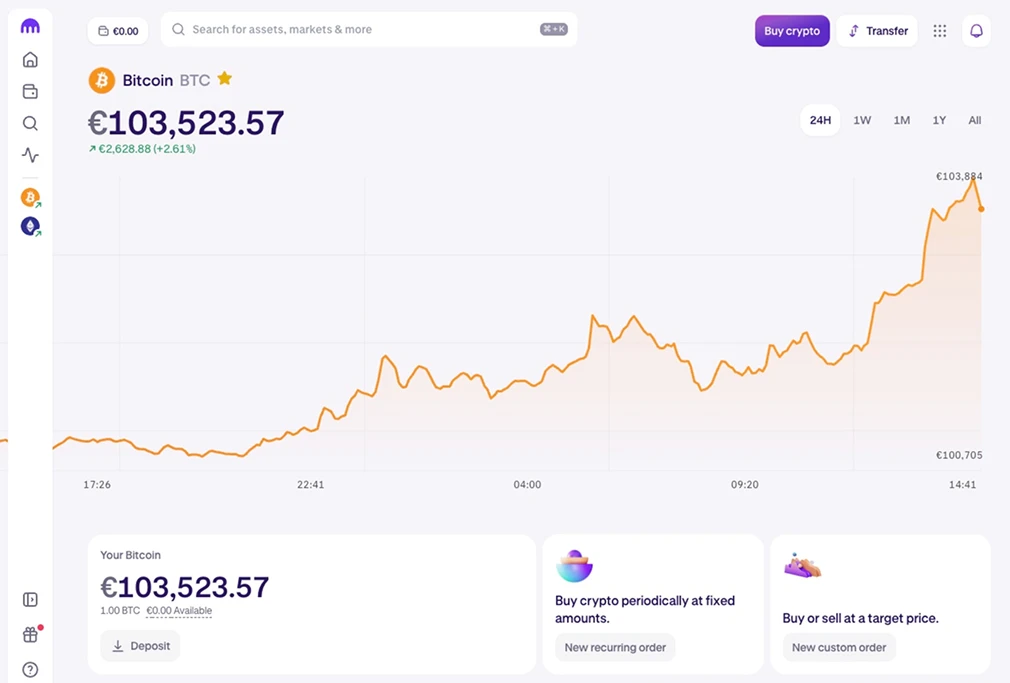
2. Uphold
Uphold has earned a strong reputation in Italy for its unmatched transparency in its asset reserves. Since launching in 2014, it has attracted millions of global users, including a rapidly growing base of Italian investors who prioritize trust, security, and early access to emerging tokens.
Traders appreciate Uphold’s simplified one-step trading process, allowing instant exchange between numerous supported assets, including crypto, fiat currencies and precious metals. It also provides staking options, enabling customers to earn rewards of up to 15.5% APY on 20 cryptocurrencies.
Security and transparency are foundational at Uphold. The exchange never loans out customer funds and publishes real-time proof-of-reserves data every 30 seconds directly on its website. This radical transparency assures investors that their assets are continuously backed.
Platform Highlights:
- Fees: Crypto trading fees range between 0.8% - 1.49%.
- Supported Assets: Over 250 cryptocurrencies, 27 fiat currencies and 4 precious metals.
- Regulation & Licensing: Compliant with EU MiCA regulations and international data protection standards (GDPR, ISO 27001).
- EUR Deposit Methods: Bank transfers, SEPA, Apple Pay, credit, and debit cards.

3. Binance
Binance is the world’s largest exchange, highly popular in Italy due to its extensive features, low fees, and diverse range of tradable assets. Founded in 2017, it now serves over 280 million users globally across 180 countries, including a substantial and rapidly expanding community of Italian traders.
The exchange provides spot markets, margin trading, and futures trading. It supports over 500 digital currencies for spot trading and 350+ derivatives contracts to trade with 100x leverage. Additionally, the copy trading feature enables users to mirror the strategies of professional traders.
Beyond trading, Binance offers users multiple ways to earn passive income, such as staking, yield farming, and participating in token launches through Launchpool and regular airdrops. The Binance NFT marketplace further diversifies opportunities by allowing users to trade, stake, and loan NFTs.
Platform Highlights:
- Fees: Trading fees start at 0.1%; further fee discounts available using the BNB token.
- Supported Assets: Over 500 cryptocurrencies.
- Regulation & Licensing: Fully compliant and regulated under the EU’s MiCA framework.
- EUR Deposit Methods: SEPA transfers, bank transfers, credit and debit cards.
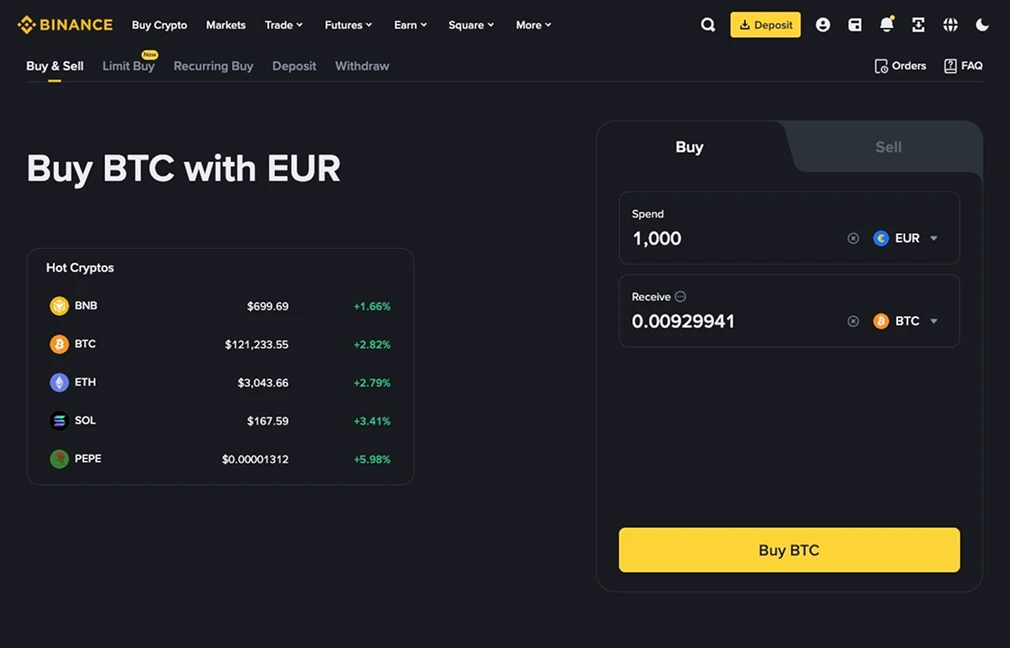
4. eToro
eToro is popular for its versatile, user-friendly platform that integrates crypto trading with traditional investments such as stocks, ETFs, commodities, and currencies. Founded in 2007, it now has over 35 million users globally, with a growing presence in Italy and Italian speaking customer support.
One of the standout features is CopyTrader™, which lets users replicate trading strategies from successful investors. This unique feature makes it easy for beginners or busy professionals to participate in cryptocurrency markets without having to constantly monitor prices and trends.
Security is central to eToro’s reputation, with robust measures protecting client assets held at renowned global banking institutions such as J.P. Morgan and Deutsche Bank. The platform is fully licensed and regulated across major jurisdictions and complies rigorously with EU standards.
Platform Highlights:
- Fees: Transparent and fixed spreads from 0.75% to 2.9%.
- Supported Assets: 70+ cryptocurrencies and thousands of stocks, ETFs, commodities, and currencies.
- Regulation & Licensing: Licensed in Europe and compliant under the EU’s MiCA regulations.
- EUR Deposit Methods: SEPA transfers, debit/credit cards, and PayPal.
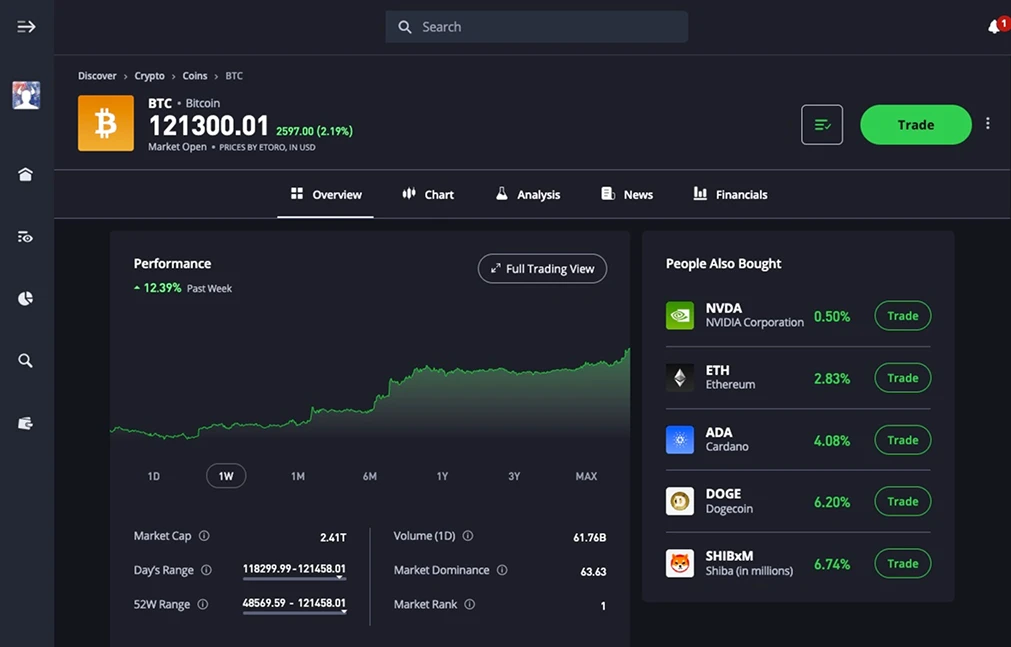
5. Bitpanda
Bitpanda is a top investment platform favored by Italian investors for its comprehensive asset range, exceptional ease-of-use, and rigorous security standards. Launched in Austria, it has rapidly grown since its founding in 2014, attracting over 6 million satisfied users across Europe.
The exchange is recognized for enabling investors to diversify portfolios across more than 3,000 assets. Users benefit from the flexibility to invest not just in cryptocurrencies, but also in fractional stocks, ETFs, commodities, precious metals, and automated crypto indices through a single interface.
Bitpanda Spotlight further distinguishes the platform by offering early access to emerging crypto projects, which might otherwise be challenging to discover. Security remains central to Bitpanda as evidenced by its ISO 27001 certification and use of secure offline wallets for asset storage.
Platform Highlights:
- Fees: Trading fees averaging around 1.49%.
- Supported Assets: 3,000+ assets including cryptocurrencies, fractional stocks, ETFs, and precious metals.
- Regulation & Licensing: Fully regulated and compliant under European (MiCA) standards.
- EUR Deposit Methods: SEPA transfers, Apple Pay, Skrill, Neteller, bank transfers, and credit/debit cards.
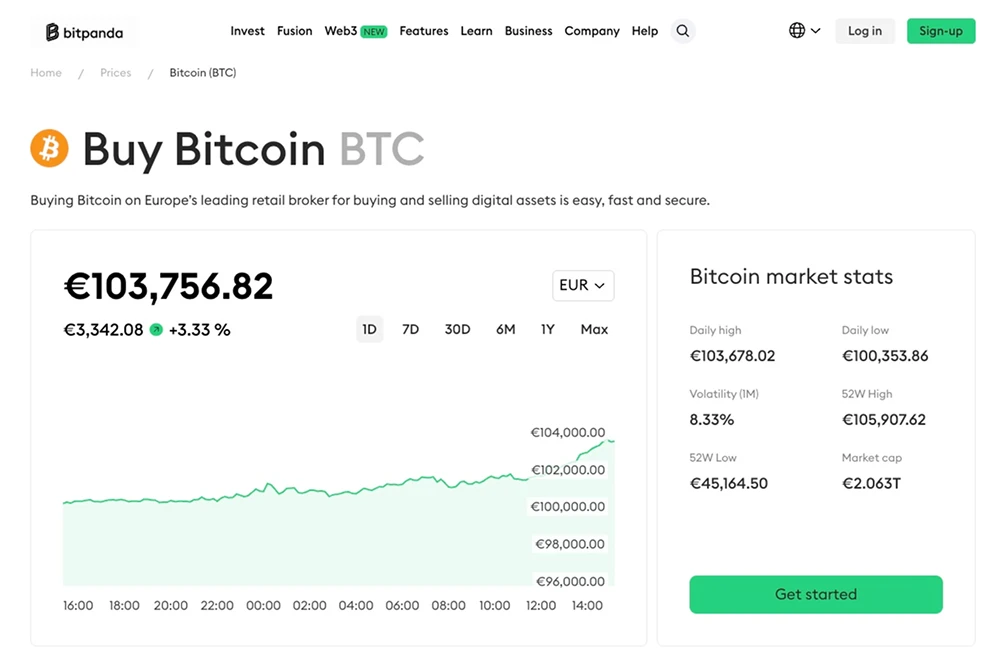
6. Young Platform
Young Platform is Italy’s leading exchange based in Turin, designed especially for newcomers to crypto investing. Launched to simplify digital asset trading, the platform provides an intuitive experience that enables beginners to buy, sell, and accumulate top cryptocurrencies like Bitcoin and Ethereum.
Investors can quickly set up automatic recurring crypto purchases with the Salvadanaio feature, creating an easy and disciplined way to build their investment portfolio. Additionally, the platform offers real-time tracking tools, instant price alerts, and a wide range of educational content.
Regulated under Italian and EU financial standards, the platform employs cutting-edge blockchain technology to protect user funds, while strictly adhering to GDPR guidelines. Deposits and transactions in euros are secure and straightforward, backed by partnerships with trusted national banks.
Platform Highlights:
- Fees: Competitive trading fees starting from 0.2%.
- Supported Assets: Over 50 cryptocurrencies.
- Regulation & Licensing: Fully regulated under Italian and European financial regulations; compliant with GDPR and MiCA standards.
- EUR Deposit Methods: SEPA bank transfers, credit and debit cards.
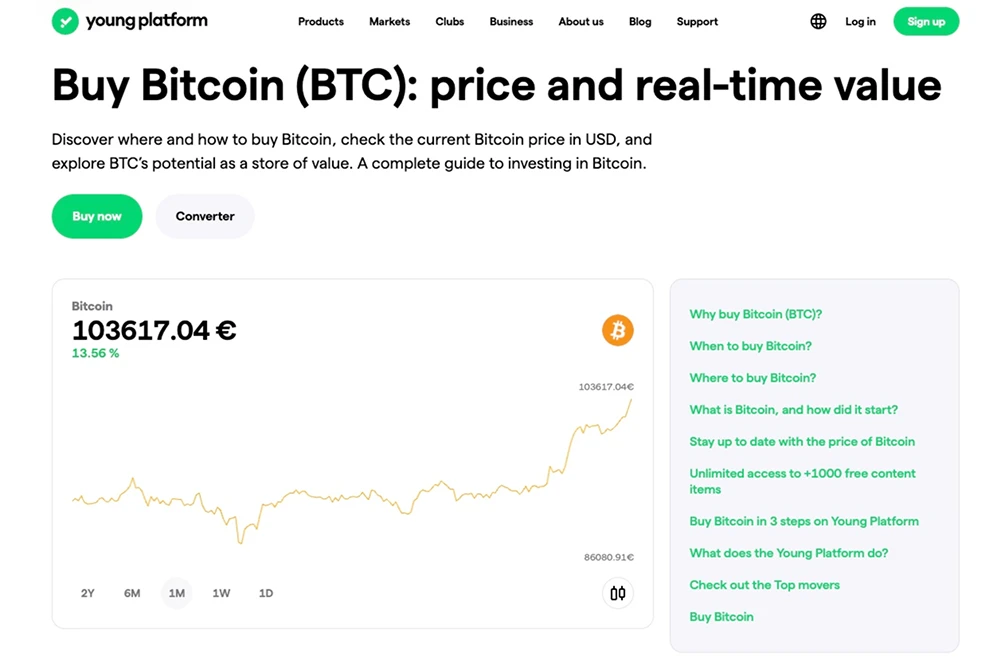
Is Crypto Regulated in Italy?
Italy’s crypto regulations have evolved since implementing the EU’s Markets in Crypto-Assets Regulation (MiCA) framework. On 14 September 2024, Legislative Decree 129/2024 formally aligned national law with Regulation (EU) 2023/1114, empowering CONSOB and the Bank of Italy to oversee different categories of tokens and service providers.
CONSOB supervises public offerings of non‑stable tokens, enforces market integrity, and issues authorizations for crypto‑asset service providers (CASPs). The Bank of Italy oversees issuers of e-money and asset-referenced tokens (stablecoins), enforces prudential rules and AML/CFT obligations, and mandates asset-segregation measures to safeguard client funds.
Providers had a transitional window, CASPs registered with Organismo Agenti e Mediatori (OAM) by December 27, 2024, and applying for MiCA authorization by June 30, 2025, with full compliance expected by December 30, 2025.
How is Crypto Taxed in Italy?
Cryptocurrency taxation in Italy follows a clearly defined set of rules set by the Agenzia delle Entrate (Revenue Agency), with the tax framework updated significantly since 2023. Italian residents involved in cryptocurrency must navigate several key taxes and reporting obligations:
- Capital Gains Tax: Profits from crypto sales, exchanges, or transactions are currently taxed at a flat rate of 26%. However, this rate will increase to 33% starting in 2026.
- Substitute Portfolio Tax (Alternative Option): Taxpayers can alternatively choose a 'substitute portfolio tax,' paying 18% of the total value of crypto holdings as of 1 January, instead of calculating capital gains. This option may be settled in one lump sum by 30 June or split into three annual payments with 3% interest on the deferred amount.
- Wealth Tax (IVAFE): Crypto assets held abroad or in personal custody are subject to an annual wealth tax (IVAFE) of 0.2%, calculated on the total value of crypto assets held on December 31 each year.
- Personal Income Tax (IRPEF): Individuals whose crypto trading activities qualify as business activities (structured and continuous trading) must report profits under standard IRPEF rates, ranging from 23% to 43%, plus regional and municipal surcharges.
Italy also actively participates in global tax transparency initiatives such as the OECD's Crypto-Asset Reporting Framework (CARF) and the EU’s DAC8 directive, ensuring cross-border information sharing to enforce compliance and prevent tax evasion.
Cryptocurrency Adoption in Italy
Italy’s cryptocurrency market is experiencing significant growth, with projected revenues reaching US$3.0 billion by 2025 and further rising to US$3.1 billion by 2026, representing a steady annual increase of around 3%.
User adoption is on the rise, with more than 17 million Italians anticipated to actively trade cryptocurrencies by 2026, corresponding to approximately 29% of the country’s population.
Bitcoin remains the preferred cryptocurrency among Italian investors, supported by growing clarity in regulatory and tax frameworks under the EU’s MiCA directive. Institutional involvement, increasing integration of crypto into traditional financial services, and broader consumer confidence are fueling this momentum.
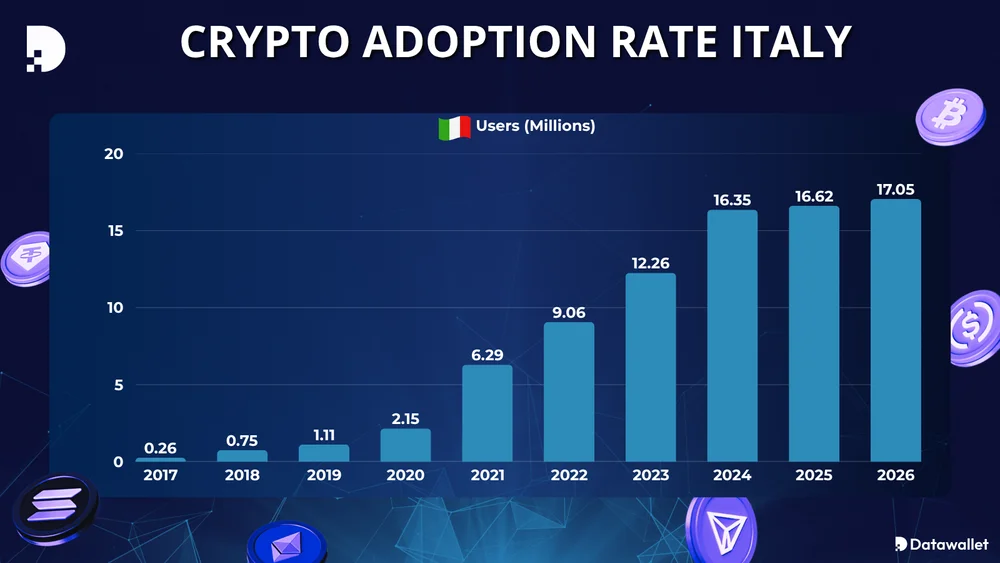
How to Buy Bitcoin in Italy
Residents looking to purchase Bitcoin should select trusted exchanges authorized by Italian regulatory bodies. Follow this straightforward guide to safely buy BTC in Italy:
- Pick an Exchange: Select a reputable platform compliant with Italian and EU regulations, such as Coinbase, Binance, or Kraken.
- Register: Sign up on the chosen exchange and undergo Know Your Customer (KYC) verification. You'll typically need valid identification, such as an Italian ID card or passport, along with proof of residency, such as a recent utility bill or bank statement.
- Deposit Funds (EUR): Deposit euros into your trading account using standard payment methods supported by Italian banks, such as SEPA transfers, debit cards, or popular payment services like PostePay.
- Purchase Bitcoin: Once funds are available, access the Bitcoin trading interface. Enter the euro amount you intend to invest, or specify the exact quantity of Bitcoin you'd like to buy, then confirm and finalize your transaction.
After purchasing Bitcoin, promptly move your holdings from the exchange into a secure wallet. Using a hardware wallet or a reputable software wallet ensures you maintain full control and significantly enhances the safety of your crypto investments.
Final Thoughts
Choosing the right cryptocurrency exchange in Italy can significantly impact your investing success. Before settling on a platform, carefully consider factors like fee structures, asset availability, euro deposit methods, and regulatory compliance.
Each exchange has unique strengths, whether it’s Kraken’s robust security, Binance’s comprehensive trading features, or Young Platform’s beginner-friendly design, so aligning these offerings with your personal trading style and goals is crucial.
Frequently asked questions
Are crypto wallets required when trading on Italian exchanges?
While crypto exchanges in Italy provide built-in wallets for trading convenience, it's highly recommended to transfer significant holdings to a private wallet. Hardware wallets like Ledger or Trezor offer enhanced security, protecting your digital assets from potential exchange vulnerabilities.
Can I buy crypto anonymously in Italy?
No, regulated Italian exchanges comply with strict Know Your Customer (KYC) guidelines, requiring verified personal identification. To trade anonymously, users would need decentralized platforms, though these carry increased regulatory and security risks.
What happens if an Italian crypto exchange fails or is hacked?
In the event of a security breach or insolvency at an Italian crypto exchange, regulatory safeguards like asset segregation mandated by CONSOB and the Bank of Italy help protect investor assets. However, holding funds in personal wallets significantly reduces risk.
What are the typical deposit and withdrawal times for EUR on Italian exchanges?
Most platforms in Italy support SEPA bank transfers, which typically take 1–2 business days. Credit and debit card transactions can be instant, though banks may add processing time. Exchanges must clearly disclose these timing details per MiCA rules.
%25201%2520(1).webp)
Written by
Emily Shin
Research Analyst
Emily is passionate about Web 3 and has dedicated her writing to exploring decentralized finance, NFTs, GameFi, and the broader crypto culture. She excels at breaking down the complexities of these cutting-edge technologies, providing readers with clear and insightful explanations of their transformative power.

.webp)
.webp)
%2520(1).webp)
